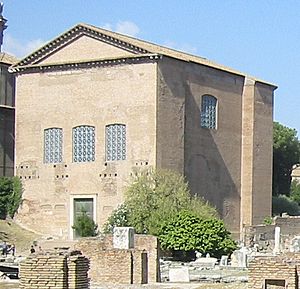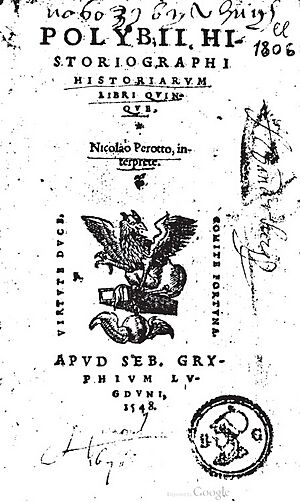The Histories (Polybius) facts for kids
Polybius was an ancient Greek historian. He wrote a very important book called Histories. This book was originally very long, with 40 parts, but only the first five parts are still complete today. Most of what we know about his work comes from smaller pieces saved in libraries. Polybius was from a Greek city called Megalopolis. He was taken to Rome as a hostage after a big war called the Third Macedonian War. While in Rome, he started writing about how Rome became a powerful empire.
Contents
What are the Histories About?
Polybius' book, Histories, covers a long period from 264 BC to 146 BC. Polybius himself lived from about 200 BC to 117 BC. He was most interested in a 53-year period (from 220 BC to 167 BC). This was when Ancient Rome grew to become the strongest power in the world. During this time, Rome defeated Carthage and took control of Hellenistic Greece.
The first five parts of his book talk about important states of that time. These include Ptolemaic Egypt, Hellenistic Greece, and Macedon. They also describe the First and Second Punic Wars in great detail.
Rome's Government Explained
In one part of his book (Book VI), Polybius describes the Roman Constitution. This was like the set of rules for how Rome was governed. He explained the powers of the consuls, the Senate, and the Roman people.
Polybius believed that Rome's success came from its "mixed constitution." This meant their government combined parts of different systems:
- A democracy (where people have a say).
- An aristocracy (where a small group of leaders rule).
- A monarchy (where one person, like a king or emperor, rules).
He thought this mix made Rome's government very strong.
The rest of the Histories talks about how Rome came to rule the Mediterranean Sea. This includes the defeat of Hannibal in 201 BC. It also covers the destruction of Carthage and the Greek city of Corinth in 146 BC.
What Polybius Thought About Fate
Tyche is a Greek word that means fate or fortune. Polybius believed that Tyche played a big role in history. He saw Tyche in two ways. It could mean random luck or chance. But Tyche was also seen as a goddess in ancient Greek times.
Polybius started writing his book because he wanted to understand the lucky events. These events helped Rome become so powerful across the Mediterranean.
Polybius on How Governments Work

In Book VI, Polybius takes a break from telling history. He explains the Roman constitution and how it was "mixed." He did this especially for his Greek readers. Greeks at that time thought that a country's strength came from its government.
The "mixed constitution" was seen as the strongest kind. It combined three main types of government that Aristotle had talked about:
- Monarchy (rule by one person).
- Aristocracy (rule by a few noble people).
- Democracy (rule by the people).
Polybius also talked about the "bad" versions of these governments:
- Tyranny (a cruel ruler).
- Oligarchy (rule by a small, selfish group).
- Ochlocracy (mob rule, where the crowd controls things).
He believed that governments would cycle through these different forms. This cycle was called anacyclosis. It would start with a monarchy and could end with mob rule.
Polybius' Book in English
The first time Polybius' Histories was translated into English was in 1568. It was done by Christopher Watson and published in London. Its title was The hystories of the most famous and worthy cronographer Polybius. Later, a scholar named F. W. Walbank wrote a detailed explanation of the Histories. This was published in three parts between 1957 and 1979.
See also
 | Leon Lynch |
 | Milton P. Webster |
 | Ferdinand Smith |


